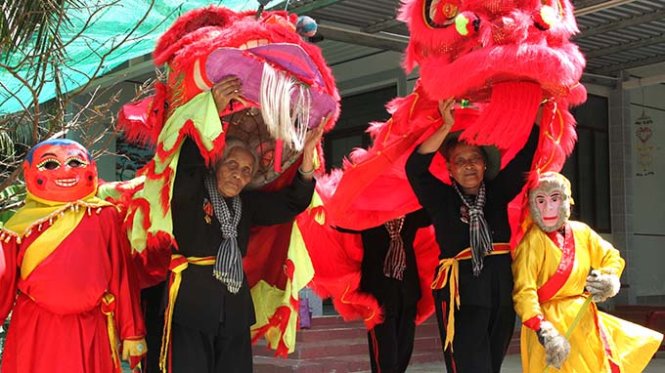Over a dozen elderly women, including octogenarians, in a Mekong Delta province have incorporated their wartime toughness into their lion dance performances over the past three decades.
>> An audio version of the story is available here
Two lions shook their heads, wagged their tails, and danced to the boisterous drum beats before making a technically demanding maneuver.
The dancers, who are just as agile and supple as those in their prime, turned out to be elderly women, including those in their 70s and 80s, who already have grandchildren and even great-grandchildren.
The women regularly rehearse in the yard of one of the members’ homes in Giong Trom District in Ben Tre Province.
They are members of the well-known Luong Hoa female lion dance troupe, which was formed thirty-four years ago.
The lion dance is a form of traditional dance in Vietnamese culture and other Asian countries in which performers mimic a lion's movements in a costume representing the animal.
Lion dances are usually performed during Tet (Lunar New Year) and other traditional, cultural and religious festivals, and important occasions such as business openings or special celebrations.

A lion dance maneuver is shown in this Tuoi Tre file photo.
Luong Hoa troupe has been invited to perform throughout the country, and has taken home special prizes at all provincial lion dancing contests and festivals.
“One shouldn’t judge a book by its cover. I feel restless at the drum beats, the lion heads weigh five or six kilograms each but are really no big deal,” said Tran Thi Sanh, 88.
Sanh is one of the troupe’s two eldest performers. The troupe is usually made up of 13 members.
Most of its members joined a female guerilla team led by Nguyen Thi Dinh, the Vietnam People’s Army’s first female general, during the war in the Southeast Asian country, which ended in 1975.
“The troupe’s history dates back to the momentous Dien Bien Phu victory in 1954. In the heated, pervasive revolutionary atmosphere, several local women improvised makeshift lion dancing kits and began performing basic lion dancing maneuvers to add weight to our political propaganda campaigns and boost locals’ morale,” Sanh recalled.
The troupe disbanded in 1975.
In early 1981, Nguyen Thi Dinh visited the district – her hometown – and urged the women to resume their performances.
Dinh then provided the women with money for performing costumes and kits, and the Luong Hoa troupe was once called Ba Dinh’s lion dance troupe.
The women sought help and training from their professional male counterparts, and also made several of their performing kits.
“We were initially faced with social stigma for being female performers, as the lion dance is mostly exclusive to males. We are lucky to have our husbands’ and children’s wholehearted support,” Nguyen Thi Thoi said.
In 1984, a high-ranking Cuban delegation paid a visit to Ben Tre and forged a relationship with the Vietnamese province.
Luong Hoa Commune, where the lion dancing troupe’s members come from, has since adopted the name of Moncada, a Cuban village which saw the beginning of an uprising against the Batista dictator regime.
Meanwhile, Hinba Bonita breeding cow farm in Cuba is also named “Ben Tre Village.”
The troupe is summoned for performances each time the province welcomes Cuban delegates.

A lion dance performance is seen in this Tuoi Tre file photo.
Mostly for pleasure
They receive performance invitations all year round, but invites peak around and during Tet, which ended on Monday last week.
“We haven’t celebrated Tet at home for almost 10 years now. We performed in the neighborhoods during the days before Tet and were ‘stationed’ at a tourism complex in Ben Tre, the province’s municipal city, during the week-long holiday,” Phuoc said.
Apart from travel expenses, the troupe is paid a small amount, but its members consider the practice a medium to bring joy to themselves and people around them.
They sometimes buy lion heads, which cost around VND2 million (US$93) apiece, with their own money.
Apart from octogenarian members, the others are busy doing menial daytime jobs, including peeling coconuts, splitting betel nuts, harvesting rice, peddling lottery tickets, and working as domestic help to eke out a meager living.
Busy as they are, they are always willing to put aside their work to show up at rehearsals and performances.
Sanh urged her nieces, who are both in their 50s and live dozens of kilometers away from the rehearsal venue, to join the troupe so that they can keep it alive after the woman and her peers pass away.
“Just let us know when someone needs lion dancing performances. We particularly love to perform on Con Dao and Phu Quoc Islands [in the southern provinces of Ba Ria-Vung Tau and Kien Giang respectively] to pay visits to the wartime prisons we once stayed in,” Vo Thi Kien, 81, a troupe member, insisted.
Like us on Facebook or follow us on Twitter to get the latest news about Vietnam!






















































